In today's digital age, the role of a Network Administrator is more critical than ever. Companies rely on network administrators to maintain the stability and security of their IT infrastructure. However, many organizations struggle to hire the right candidate because they often overlook the precise skills and qualifications required for the role. It's crucial to understand the technical and interpersonal skills needed to ensure the network administrator you hire can effectively manage your systems and support your team.
This article provides valuable insights into hiring a Network Administrator, covering the entire process from crafting a job description to conducting technical interviews. Additionally, explore top platforms for sourcing candidates and the difference between network administrators and engineers. For more insights on the skills needed, visit our skills assessment tools page.
Table of contents
Why Hire a Network Administrator?
To determine if you need a network administrator, start by identifying your organization's current networking challenges. For example, you might be experiencing frequent network outages, slow data transfers, or security vulnerabilities that need addressing.
Consider the following scenarios where a network administrator can add value:
- Setting up and maintaining complex network infrastructures
- Implementing robust security measures to protect against cyber threats
- Troubleshooting and resolving network-related issues quickly
If these tasks are becoming too time-consuming for your existing IT team or if you lack the in-house expertise, it's time to hire a full-time network administrator. For short-term projects or smaller organizations, working with a consultant might be a more cost-effective solution.
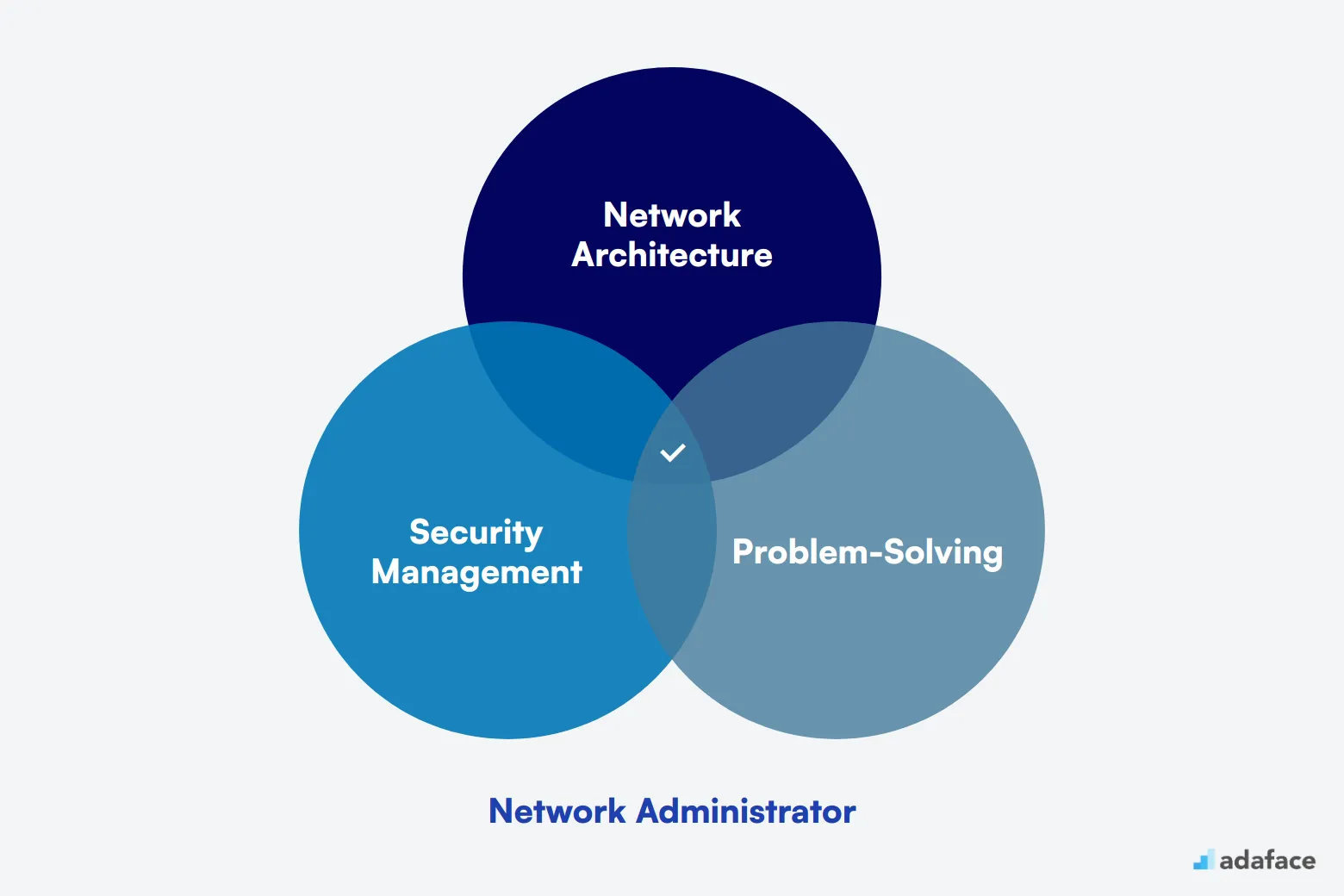
Network Administrator Hiring Process
The Network Administrator hiring process typically spans 4-8 weeks. Here's a quick overview of the timeline and key steps involved:
- Create and post a detailed job description
- Review resumes (3-5 days after posting)
- Conduct skill assessments (1 week)
- Interview shortlisted candidates
- Make an offer to the best candidate
This process allows you to thoroughly evaluate candidates' technical skills and cultural fit. In the following sections, we'll dive deeper into each step, providing checklists and helpful resources to streamline your Network Administrator hiring process.
Key Skills and Qualifications to Seek in a Network Administrator
When hiring a Network Administrator, defining the right candidate profile is key to finding the right fit for your organization. It can be tricky, as what constitutes a must-have skill in one company may be a mere preference in another. For instance, while knowledge of certain network protocols might be non-negotiable for one team, another team may have different priorities.
To help clarify your search, it's important to distinguish between required qualifications and preferred skills. Below is a breakdown of the essential skills you should consider during the hiring process.
| Required skills and qualifications | Preferred skills and qualifications |
|---|---|
| Bachelor's degree in Computer Science, Information Technology, or related field | Relevant industry certifications (e.g., CCNA, CompTIA Network+) |
| 3+ years of experience in network administration | Experience with cloud networking (AWS, Azure, or GCP) |
| Proficiency in configuring and maintaining network hardware and software | Familiarity with scripting languages (e.g., Python, PowerShell) |
| Strong knowledge of network protocols (TCP/IP, DHCP, DNS, etc.) | Knowledge of virtualization technologies |
| Experience with network security and firewall management | Experience with VoIP systems |
How to write a Network Administrator job description?
Once you have a candidate profile ready, the next step is to capture that information in the job description to attract the right candidates. A well-crafted job description is your first handshake with potential hires.
- Highlight key responsibilities and impact: Clearly outline the day-to-day tasks of a Network Administrator, including maintaining network infrastructure and ensuring system security. Emphasizing how these tasks contribute to the organization's efficiency will attract candidates who are looking for impactful work.
- Balance technical skills with soft skills: It's important to list essential technical qualifications, such as experience with routers, switches, and firewalls. However, don't forget to highlight required soft skills like problem-solving, teamwork, and strong communication, which are equally important in this role.
- Showcase your company's unique selling points: Potential candidates want to know what makes your organization special. Whether it's a commitment to innovation, opportunities for professional growth, or a supportive work culture, make sure to convey these aspects to attract top-tier talent.
Top Platforms to Source Network Administrators
Now that you have a well-crafted job description, it's time to list it on job platforms to attract potential candidates. The right platform can significantly boost your chances of finding qualified Network Administrators. Let's explore some top options for sourcing these tech professionals.
Ideal for finding experienced professionals looking for full-time positions. Its vast network allows recruiters to tap into passive candidates.

Indeed
A comprehensive job board that caters to a wide range of job types, including full-time roles. Strong reach across industries.

FlexJobs
Excellent for listing remote and flexible job opportunities. It targets professionals seeking work-life balance.

Beyond these popular sites, there are specialized platforms catering to tech talent and remote work. Dice is a tech-focused job board ideal for full-time Network Administrator roles. For remote positions, Remotive and FlexJobs are excellent choices. Startups might find success on AngelList, while those seeking freelancers can explore Toptal or Upwork. Remember, a multi-platform approach often yields the best results in tech recruitment.
Keywords to Look for in Network Administrator Resumes
Resume screening is a time-saver when hiring Network Administrators. It helps you quickly identify candidates with the right skills and experience before moving to interviews.
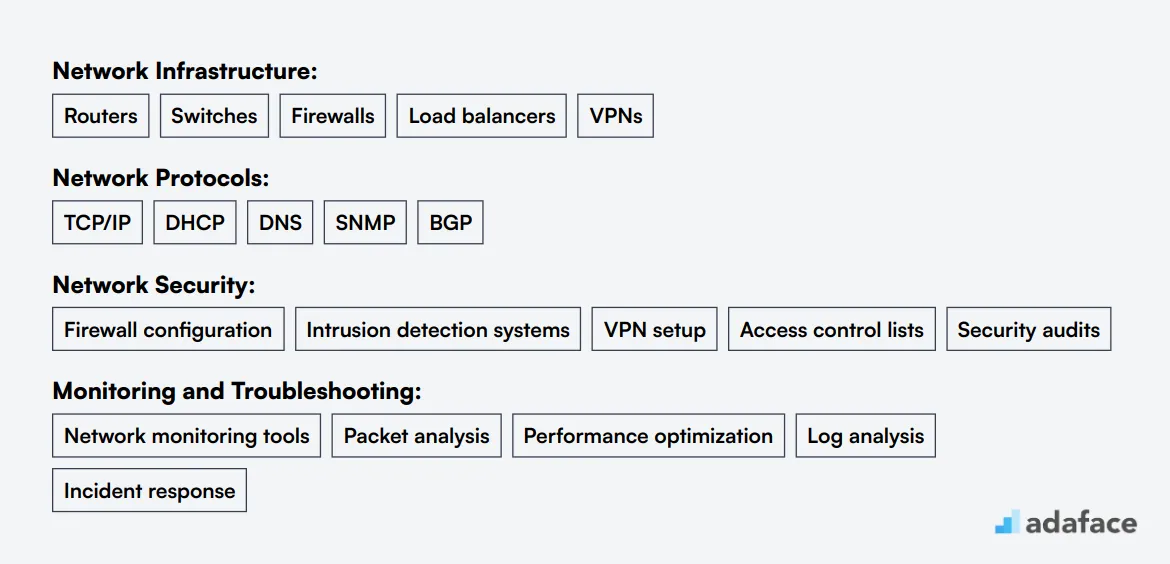
When manually screening resumes, focus on key technical skills like network protocols (TCP/IP, DHCP, DNS), security management, and troubleshooting abilities. Look for certifications such as CCNA or CompTIA Network+ and experience with specific hardware and software relevant to your organization.
To speed up the process, consider using AI-powered tools or language models. These can quickly scan multiple resumes, matching them against your job requirements and providing a shortlist of top candidates based on key Network Administrator skills.
Here's a sample prompt for AI-assisted resume screening:
TASK: Screen resumes for Network Administrator role
INPUT: Resumes
OUTPUT: For each resume, provide:
- Name
- Email
- Matching keywords
- Score (out of 10)
- Recommendation
- Shortlist (Yes/No/Maybe)
KEYWORDS:
- Network protocols (TCP/IP, DHCP, DNS)
- Security (firewalls, VPNs, access control)
- Hardware (routers, switches, load balancers)
- Monitoring and troubleshooting
- Certifications (CCNA, CompTIA Network+)
Top Skills Tests for Assessing Network Administrators
Skills tests are a great way to evaluate Network Administrator candidates beyond their resumes. They provide objective insights into a candidate's technical abilities and problem-solving skills. Here are five recommended tests to assess potential Network Administrators:
System Administration Test: This system administration test evaluates a candidate's ability to manage and maintain computer systems and networks. It covers key areas like server management, network protocols, and troubleshooting.
Network Engineer Test: Use this network engineer assessment to gauge a candidate's understanding of network design, implementation, and maintenance. It includes questions on routing protocols, network security, and performance optimization.
Linux Test: Many network systems run on Linux, making this Linux skills test valuable. It assesses proficiency in Linux system administration, command-line operations, and basic scripting.
Windows System Administration Test: For environments using Windows servers, this Windows administration test is useful. It covers Active Directory, Group Policy, and other Windows-specific network management tools.
Cisco Routing and Switching Test: Cisco equipment is common in many networks. This Cisco skills assessment evaluates knowledge of Cisco router and switch configuration, VLAN setup, and network troubleshooting.
Structuring Technical Interviews for Network Administrator Candidates
After candidates pass the initial skills tests, it's time for technical interviews to assess their hard skills in depth. While skills tests help filter out unfit candidates, technical interviews are key to identifying the best fit for the role. Let's look at some sample interview questions to help you evaluate Network Administrator candidates effectively.
Consider asking: 1) How would you troubleshoot slow network performance? 2) Explain the differences between TCP and UDP. 3) What steps would you take to secure a wireless network? 4) How do you approach network documentation? 5) Can you describe a challenging network issue you've resolved? These questions help assess problem-solving skills, technical knowledge, security awareness, organization, and real-world experience - all critical for a Network Administrator role.
What is the Cost of Hiring a Network Administrator?
Hiring a Network Administrator can vary widely in cost depending on factors such as geography and experience. In the United States, the average salary is around $87,433, with a range from $56,768 to $122,960. Other countries, like India, show much lower averages, typically between INR 229,822 and INR 782,856.
Network Administrator Salary United States
The average Network Administrator salary in the United States is approximately $87,433. However, salaries can vary significantly based on location and experience. The lowest reported salary is about $56,768, while the highest reaches up to $122,960. For example, in Quantico, VA, salaries range from $106,678 to $144,890, while in Anchorage, AK, the range is much narrower, staying constant at $43,548.
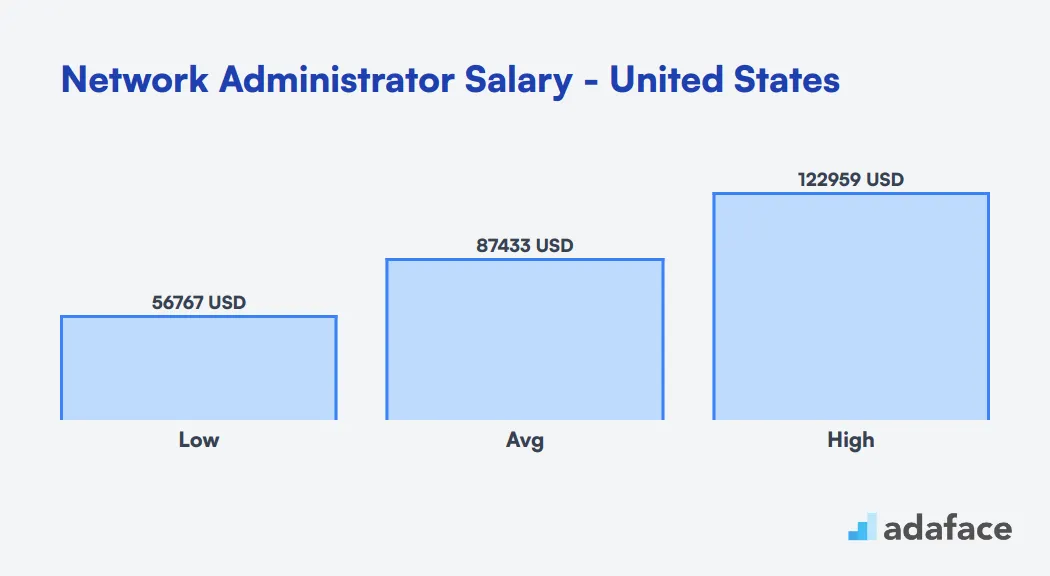
Network Administrator Salary in Canada
The average salary for a Network Administrator in Canada is approximately CAD 78,965. Salaries can range from a low of about CAD 56,975 to a high of around CAD 103,638 depending on factors such as location and experience.
For example, in cities like Montréal and Ottawa, the median salary is around CAD 90,900 and CAD 79,673 respectively, while in Calgary, the median drops to about CAD 58,072. Understanding these figures can help you set competitive offers.
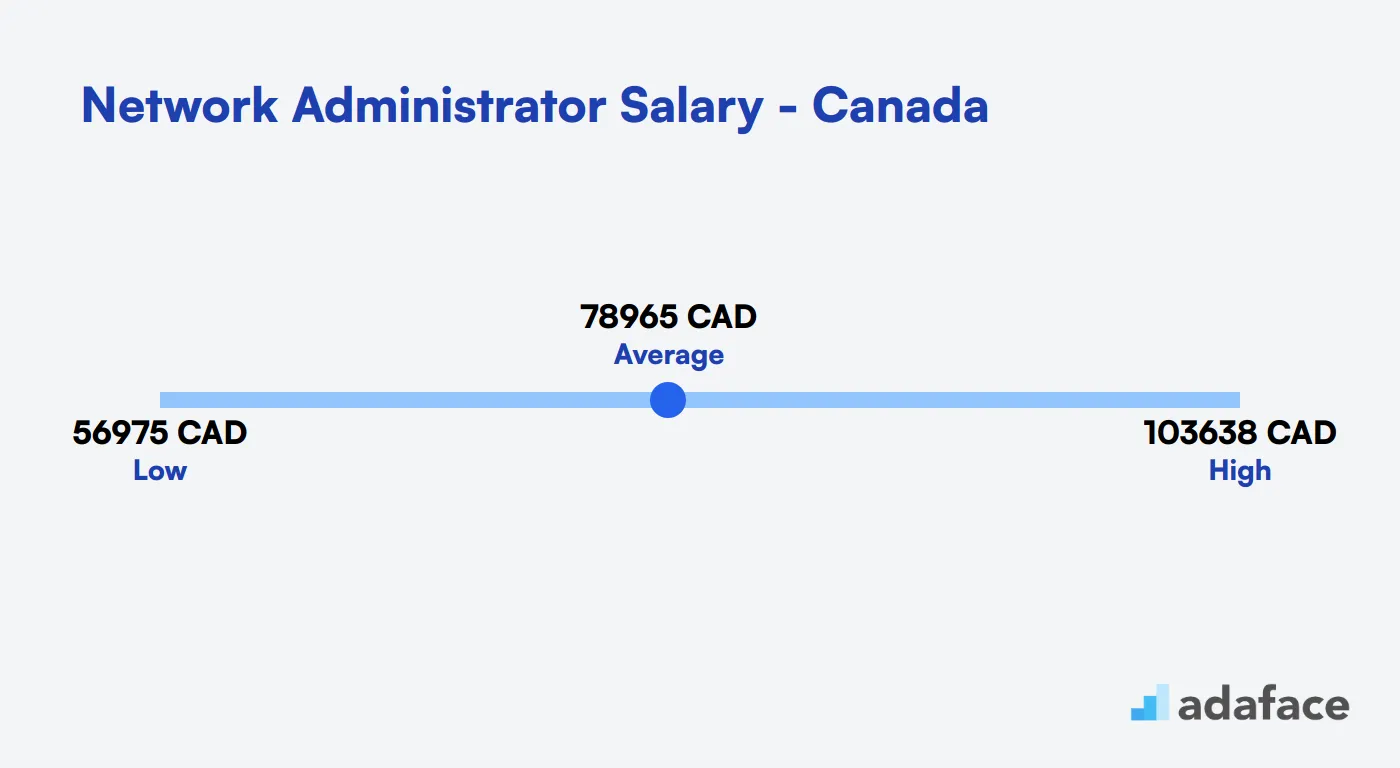
Network Administrator Salary in India
The salary of a Network Administrator in India varies significantly based on location and experience. On average, salaries range from INR 229,822 to INR 782,856 per year, with a median salary of approximately INR 424,167.
In major cities like Bengaluru, Mumbai, and Hyderabad, salaries tend to be higher, with averages around INR 708,815, INR 660,947, and INR 511,731 respectively. Understanding these figures can help recruiters attract the right talent.
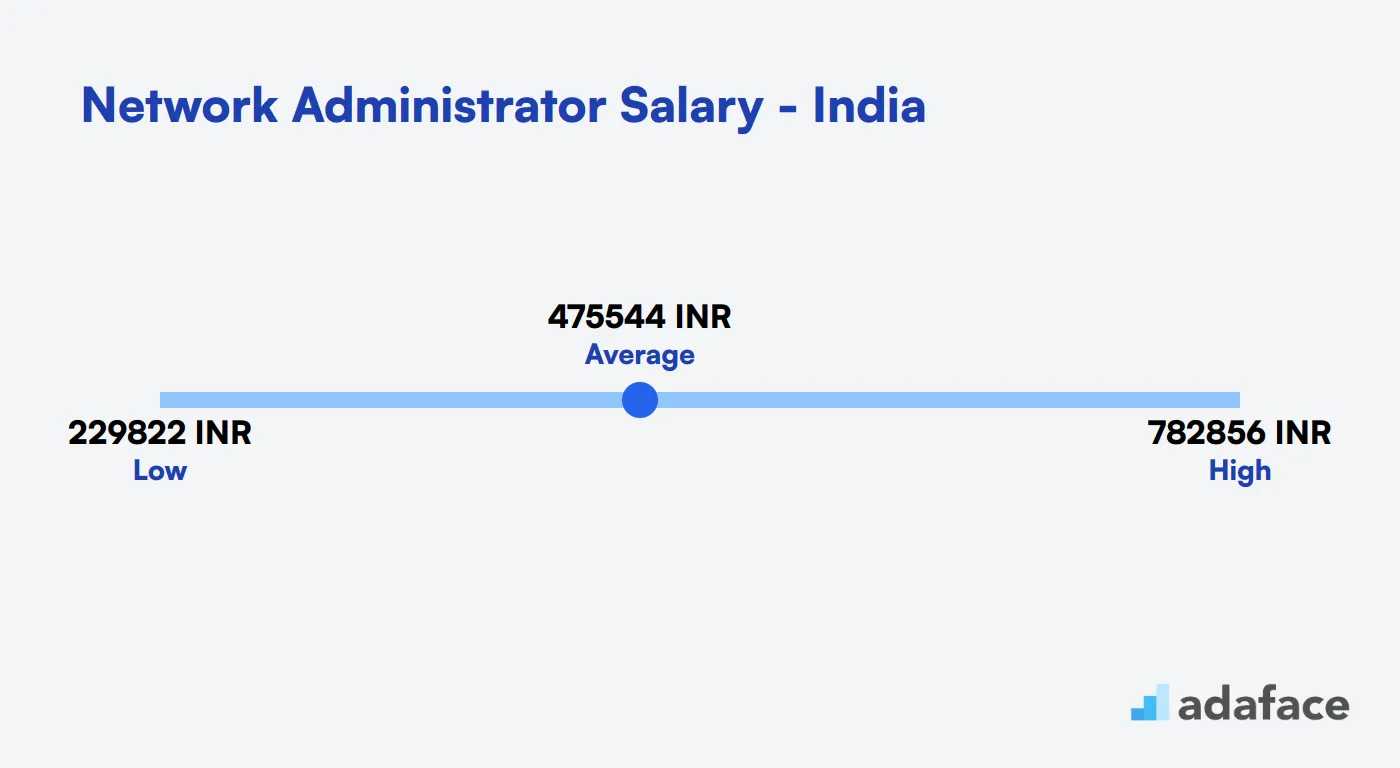
What's the difference between a Network Administrator and a Network Engineer?
Network Administrators and Network Engineers are roles that often get mixed up because both are involved in managing and maintaining network systems. However, they differ significantly in scope, responsibilities, and skillsets. Understanding these differences is key to hiring the right professional for your organization's needs.
A Network Administrator usually holds an Associate's or Bachelor's degree and may have certifications such as CompTIA Network+ or CCNA. They focus on the day-to-day operations of a network, including maintenance, troubleshooting, and user support. Their tasks include ensuring that network systems are running smoothly and performing basic scripting. Network Administrators are generally in entry to mid-level positions, with salaries in the lower to mid-range.
In contrast, a Network Engineer often holds a Bachelor's or Master's degree, with advanced certifications like CCNP or CCIE. They are responsible for network design, optimization, and advanced configurations. Network Engineers focus on network architecture and capacity planning, requiring deep technical expertise and advanced scripting skills. These roles are typically mid to senior-level positions with salaries ranging from mid to high. For more insights on the skills required for network professionals, you can explore the Adaface skills blog.
| Network Administrator | Network Engineer | |
|---|---|---|
| Education Level | Associate's or Bachelor's degree | Bachelor's or Master's degree |
| Certifications | CompTIA Network+, CCNA | CCNP, CCIE |
| Primary Focus | Day-to-day network operations | Network design and optimization |
| Technical Depth | Broad knowledge, less specialized | Deep technical expertise |
| Typical Tasks | Maintenance, troubleshooting, user support | Network architecture, advanced configurations, capacity planning |
| Scripting/Programming Skills | Basic scripting | Advanced scripting, some programming |
| Career Progression | Entry to mid-level position | Mid to senior-level position |
| Salary Range | Lower to mid-range | Mid to high-range |
What are the ranks of Network Administrators?
In the tech landscape, many confuse the roles of Network Administrators with similar IT positions. However, understanding the hierarchy and specific responsibilities of these ranks is key for effective recruitment.
• Junior Network Administrator: This entry-level position typically involves supporting the network infrastructure. Junior network administrators assist in monitoring systems, troubleshooting basic issues, and performing routine maintenance under the supervision of more experienced staff.
• Network Administrator: The core role focuses on maintaining and optimizing an organization's network. Responsibilities include configuring network hardware, monitoring performance, and implementing security measures to protect data.
• Senior Network Administrator: This role involves advanced troubleshooting and strategic planning. Senior network administrators oversee complex network systems, mentor junior staff, and may collaborate on budget planning for IT resources.
• Network Architect: A more specialized position, network architects design and implement complex network solutions. They work closely with management to ensure that the network infrastructure aligns with the organization's goals and requirements.
• Network Manager: This is a leadership role that encompasses overseeing the network team and ensuring that network operations run smoothly. Network managers are involved in strategic decision-making regarding network policies, budget allocation, and technology upgrades.
Hire the Best Network Administrators for Your Team
Throughout this blog post, we have navigated the intricacies of hiring a Network Administrator, from understanding the role's significance to identifying the key skills and qualifications needed. We've explored strategies for crafting effective job descriptions, sourcing top talent, and conducting thorough technical interviews.
If there's one takeaway to remember, it's this: the accuracy of your hiring process hinges on using well-crafted job descriptions and skills tests. To ensure you're assessing the right skills, consider utilizing targeted assessments like the Network Engineer Test to find the best candidates for your needs.
Linux System Administrator Online Test
FAQs
A Network Administrator is responsible for maintaining computer networks, ensuring network security, troubleshooting network issues, and supporting end-users.
A Network Administrator typically focuses on the day-to-day operations and maintenance of networks, while a Network Engineer designs and implements network solutions and systems.
Look for candidates with a strong background in computer science or IT, experience with network technologies, and relevant certifications such as Cisco's CCNA or CompTIA Network+.
Use skills tests and technical interviews to evaluate a candidate's expertise in network configuration, troubleshooting, and security protocols. Consider our networking interview questions for more guidance.
Look for candidates on professional networking sites like LinkedIn, tech-focused job boards, and consider using recruitment platforms that cater to IT roles.
Focus on problem-solving scenarios, ask specific questions related to network security, and assess their ability to troubleshoot real-time issues. For more questions, see our network administrator interview questions.
The job description should detail key responsibilities, required technical skills, any necessary certifications, and a brief overview of your company’s network infrastructure. See our network administrator job description for an example.

40 min skill tests.
No trick questions.
Accurate shortlisting.
We make it easy for you to find the best candidates in your pipeline with a 40 min skills test.
Try for freeRelated posts
Free resources



